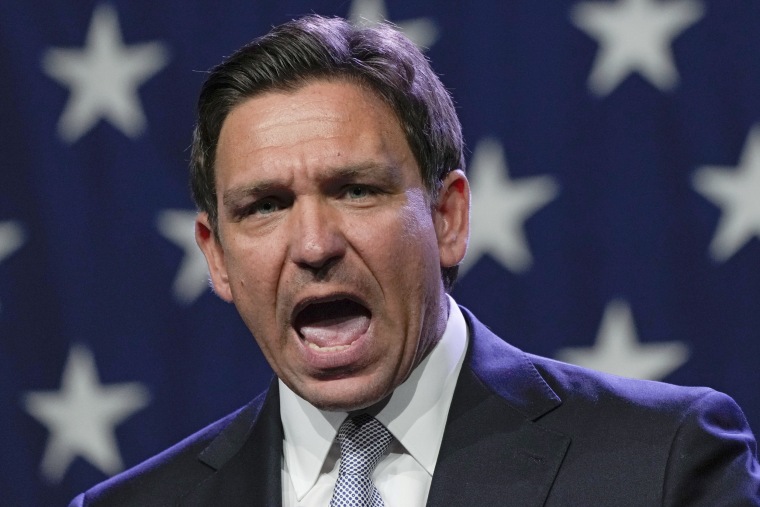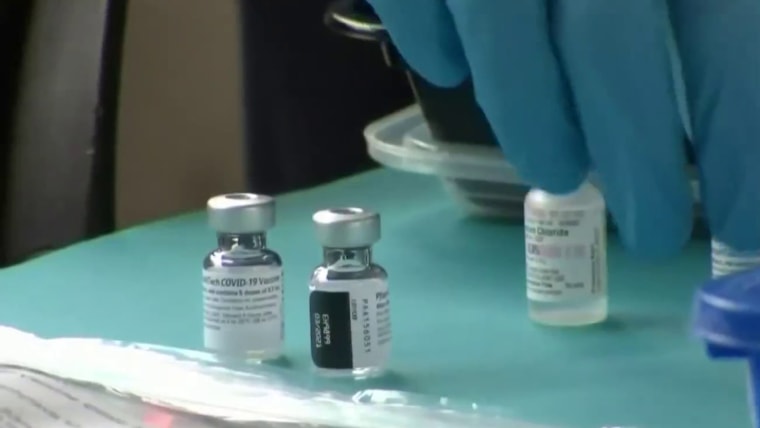In a deviation from federal recommendations, Florida Gov. Ron DeSantis’ administration is advising residents under age 65 not to get the new Covid boosters from Pfizer and Moderna.
“What I have directed our department to do is to provide guidance that really recommends and advises against the use of these mRNA Covid-19 vaccines for anyone under 65,” the state surgeon general, Dr. Joseph Ladapo, said at an online panel hosted by DeSantis on Wednesday.
The statement ignores the Centers for Disease Control and Prevention’s recommendations: The agency said Tuesday that everyone ages 6 months and up who has not gotten a Covid shot within the last two months should get a new booster, which targets a subvariant of omicron called XBB.1.5.
“Vaccination remains the best protection against Covid-19-related hospitalization and death. Vaccination also reduces your chance of suffering the effects of long Covid,” the CDC said in a statement Tuesday.
But Ladapo questioned the CDC’s rationale.
“With virtually every walking human being having some degree of immunity and the questions we have about safety and about effectiveness — especially about safety — my judgment is that it’s not a good decision for young people and for people who are not at high risk at this point in the pandemic,” Ladapo said.
The CDC’s director, Dr. Mandy Cohen, fired back Wednesday, calling Florida’s move “dangerous” in a statement shared by the White House.
“As we head into the fall and winter seasons, it is important that Americans get the updated COVID-19 vaccine. They are proven safe; they are effective, and they have been thoroughly and independently reviewed by the FDA and CDC,” Cohen said. “Since this Administration’s launch of the largest adult vaccination program in our nation’s history, COVID-19 vaccines have saved millions of lives and kept countless people out of the hospital. Public health experts are in broad agreement about these facts, and efforts to undercut vaccine uptake are unfounded and dangerous.”
DeSantis’ panel was the latest example of his administration’s defying federal guidelines related to Covid vaccines — opposition that helped transform DeSantis into a national Republican star at the height of the pandemic.
DeSantis originally supported Covid shots, noting in July 2021 that “these vaccines are saving lives.” Since then, however, he has built his administration’s health care platform around the notion that Covid vaccines are unsafe and unproven — a stance not supported by scientific consensus. Ladapo, whom DeSantis appointed in September 2021, has become one of the country’s most prominent Covid vaccine skeptics.
In recent weeks, DeSantis’ presidential campaign has used the issues of Covid and vaccines to attack former President Donald Trump, under whose administration the mRNA vaccines were developed. Trump continues to lead DeSantis by wide margins in most public polls.

The latest Covid boosters are updated versions of the mRNA vaccines from Pfizer and Moderna. The U.S. has administered hundreds of millions of doses of previous versions of those shots over more than 2½ years, without widespread safety issues.
Both vaccines have been associated with an elevated risk of myocarditis — inflammation of the heart muscle — among teenage boys. Still, the CDC’s advisory committee determined Tuesday that the benefits of vaccination outweighed the risk, even for that group.
Moderna presented data to the committee based on a trial in humans, showing that its new booster is safe and that it spurs antibody protection against several coronavirus subvariants. Pfizer’s data, meanwhile, showed an increased antibody response in laboratory studies of mice.
The Florida Health Department, however, wrote in a release that “the most recent booster approval was granted in the absence of any meaningful booster-specific clinical trial data performed in humans.”
Some doctors say certain young people may not need new boosters
In the wake of the CDC’s recommendation, some doctors have offered more nuanced guidance about who should get the new boosters, given that people’s risk of severe illness varies widely.
Dr. Paul Offit, a vaccine expert at Children’s Hospital of Philadelphia, said that for healthy, young people, the new shot is most likely “low risk, low reward.”
“You buy yourself a few months of protection against mild disease for a virus that doesn’t have a clear seasonality yet,” Offit said, adding that young, healthy people who are already vaccinated and have gotten Covid before “should feel confident that you are well-protected against serious illness.”
Dr. Dan Barouch, the director of the Center for Virology and Vaccine Research at Beth Israel Deaconess Medical Center in Boston, said immunity from mRNA boosters wanes after four to six months, whereas immunity from a Covid infection seems to last about eight to 12 months. The greatest protection comes from hybrid immunity, he said — a combination of vaccination and natural infection.
Barouch said doctors generally agree that “the benefit of the boosters is highest in people who are at high risk of severe disease.”
“And then everyone would agree that people at low risk of severe disease — such as younger, healthier populations — have a lower benefit of the boosters. Different people will make different decisions based on that information,” he said.
The United Kingdom has opted for a different vaccination strategy from the U.S.’: It is offering boosters this fall only to certain groups, including people ages 65 and up, residents in elderly care homes and younger people with elevated risks of severe disease.
But advising against vaccines for all people under 65, as Ladapo has, could jeopardize the health of some vulnerable groups, Offit said.
“You can certainly be hospitalized at less than 65 years of age if you have comorbidities or you’re immune-compromised or you’re pregnant, so that doesn’t make any sense,” he said.







